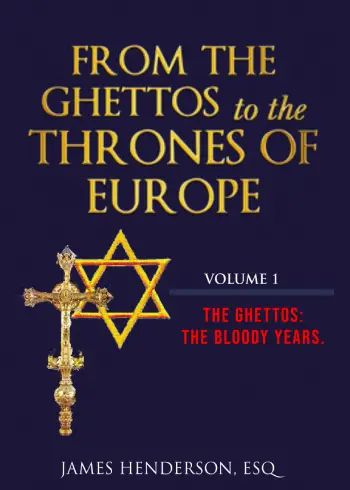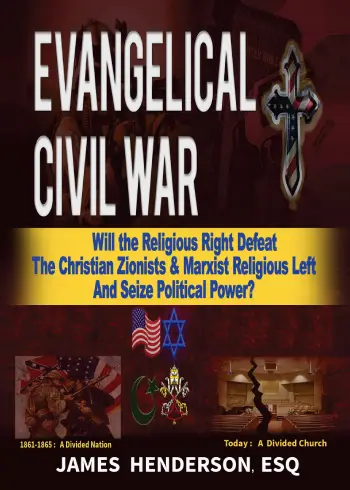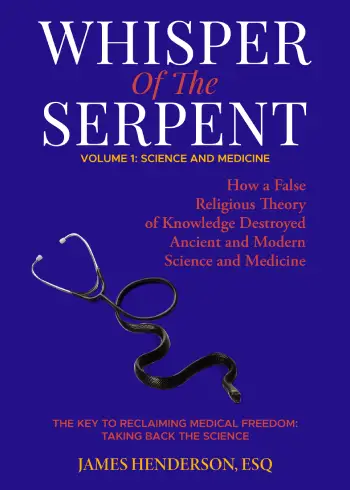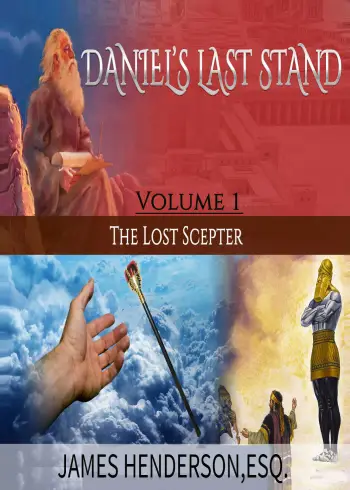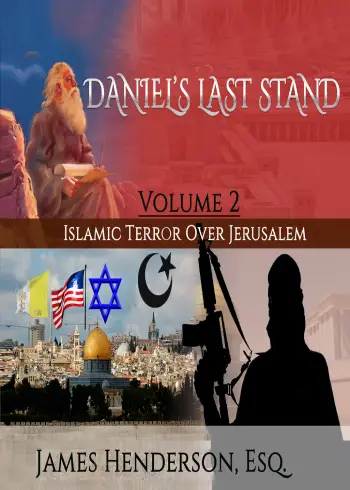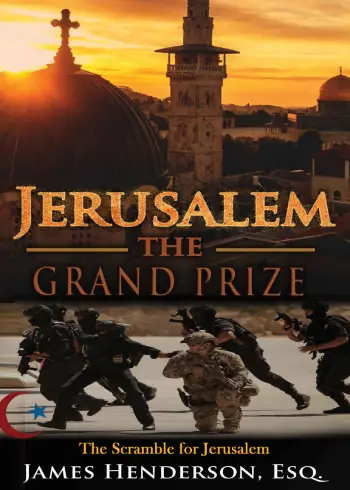
Jerusalem - The Grand Prize
In Jerusalem: The Grand Prize, attorney Henderson reveals that overshadowing the blood-stained march of militant Muslim groups like Al Qaeda and ISIS in their drive to re-establish the Islamic Caliphate that stretched from Spain to China, is a religious confrontation of apocalyptic proportions:
- Jews, Muslims, Catholics, and Evangelicals, all claiming descent from Abraham, have end-time scripts demanding exclusive control of Jerusalem.
- All feature Jerusalem as the capital of a coming Messianic kingdom.
- Jerusalem is the Grand Prize
They cannot all be right, argues Henderson. But more ominously, he asserts, is the reality that one's Messiah may be the other's Antichrist:
- A Christian Anti-Christ of Jewish descent appears in Europe.
- Posing as the longed-for Jewish Messiah, he gives permission to destroy the Dome of the Rock and rebuild the Third Temple.
- Rapture-believing Evangelicals, holding that the Temple must be established before their Rapture, supply the funds to rebuild the Temple.
- The Muslim response? Predictable and cataclysmic, as they call upon their Mahdi for vengeance.
Jerusalem: The Grand Prize argues that traditional enemies, Sunni and Shia jihadists, respond by burying the sword in the sands of Palestine as they cooperate to establish the capital of their new Caliphate, upon the ruins of Jerusalem. Because America and Europe are the armory of Israel, the road to Jerusalem, the Terrorists chant, lies through the ruins of Washington and the capitals of Europe.
False theologies have tremendous consequences, contends Henderson. With consummate skill Henderson shows that the scramble to conquer Jerusalem is the product of fatal end-time delusions, which threaten to engulf the world in a deluge of war and bloodshed, as they all, ironically, struggle to gain control over the City of Peace.
While all eyes are on Jerusalem, Henderson warns that Papal Rome is playing a high-stakes game behind the scenes: Secretly fanning the flames of war between age-old antagonists so as to position itself as peacemaker and only rightful heir to Jerusalem - the birthplace of Christianity.
James Henderson is a writer, educator and attorney. Schooled in England, he graduated from Newbold College before immigrating to the United States. Henderson graduated from Pepperdine University School of Law in 1978 and subsequently served as an assistant dean and professor of legal philosophy at a private law school. Attorney Henderson is the author of several books, including his newly published From the Ghettos to the Thrones of Europe, which unmasks the ruling elite and their agenda for America and the world.
Book Reviews
In "Jerusalem: The Grand Prize," James Henderson plunges readers into a tumultuous exploration of religious fervor, geopolitical tension, and apocalyptic prophecy surrounding the ancient city of Jerusalem. Through meticulous analysis and vivid narrative, Henderson unveils the intricate layers of conflict that converge upon this sacred ground, portraying it not only as a coveted geopolitical prize but also as the focal point of deeply ingrained religious narratives.
At the heart of the narrative lies a clash of eschatological beliefs, with Jews, Muslims, Catholics, and Evangelicals all laying claim to Jerusalem as the epicenter of their respective end-time scenarios. Henderson skillfully navigates through these diverse perspectives, illustrating how each group's interpretation of prophecy fuels their aspirations for exclusive control over the city.
The most chilling aspect of Henderson's thesis is the notion of conflicting messianic figures and the catastrophic consequences that ensue. Through a riveting scenario, he paints a picture of a false messiah emerging in Europe, masquerading as the long-awaited Jewish Messiah and igniting a chain reaction of violence and destruction, particularly concerning the holy site of the Dome of the Rock and the prospect of rebuilding the Third Temple.
Moreover, Henderson astutely highlights the role of external powers, particularly Papal Rome, in exacerbating tensions for their own geopolitical agendas. He exposes the Machiavellian maneuvers behind the scenes, where Rome manipulates age-old animosities to position itself as the supposed peacemaker and ultimate heir to Jerusalem's legacy—a chilling reminder of the political machinations lurking beneath the veneer of religious fervor.
Through Henderson's penetrating analysis, readers are confronted with the sobering reality of how entrenched religious beliefs can fuel intolerance, persecution, and ultimately, violence on a global scale. "Jerusalem: The Grand Prize" serves as a poignant warning against the dangers of unchecked fanaticism and the catastrophic consequences of allowing ancient prophecies to dictate contemporary geopolitics.
In conclusion, James Henderson's "Jerusalem: The Grand Prize" is a thought-provoking and timely exploration of religious intolerance and persecution in the context of one of the world's most contested cities. With meticulous research and compelling prose, Henderson offers readers a sobering glimpse into a world where faith, politics, and prophecy collide with devastating consequences.
Jerusalem: The Grand Prize by James Henderson offers a gripping exploration of the complex and volatile dynamics surrounding the holy city of Jerusalem. In this thought-provoking work, Henderson delves into the religious, political, and ideological forces at play in the quest for control over Jerusalem, highlighting the profound implications for global peace and stability.
Henderson skillfully navigates through the intricate web of beliefs and aspirations held by different religious groups, including Jews, Muslims, Catholics, and Evangelicals, all of whom lay claim to Jerusalem as a central tenet of their faiths. He compellingly argues that the convergence of these diverse narratives, each with its own eschatological vision, creates a powder keg of tension and conflict, with Jerusalem emerging as the ultimate prize in an apocalyptic struggle for supremacy.
Central to Henderson's analysis is the notion of conflicting messianic expectations and the potential for these divergent interpretations to catalyze catastrophic violence. He provocatively suggests that the pursuit of religious agendas, fueled by end-time prophecies and theological dogma, poses a grave threat to global security, as rival factions vie for dominance over Jerusalem's sacred sites.
Moreover, Henderson sheds light on the geopolitical dimensions of the Jerusalem dilemma, exposing the Machiavellian maneuverings of external actors, such as Papal Rome, in exploiting religious discord for their own strategic gain. By illuminating the covert machinations of power and influence behind the scenes, he underscores the urgent need for greater awareness and vigilance in navigating the intricate geopolitics of the Middle East.
In conclusion, Jerusalem: The Grand Prize is a sobering and enlightening examination of one of the most enduring and contentious issues of our time. Henderson's meticulous research, incisive analysis, and compelling narrative make this book essential reading for anyone seeking a deeper understanding of the complex dynamics shaping the fate of Jerusalem and its implications for global peace and security.
